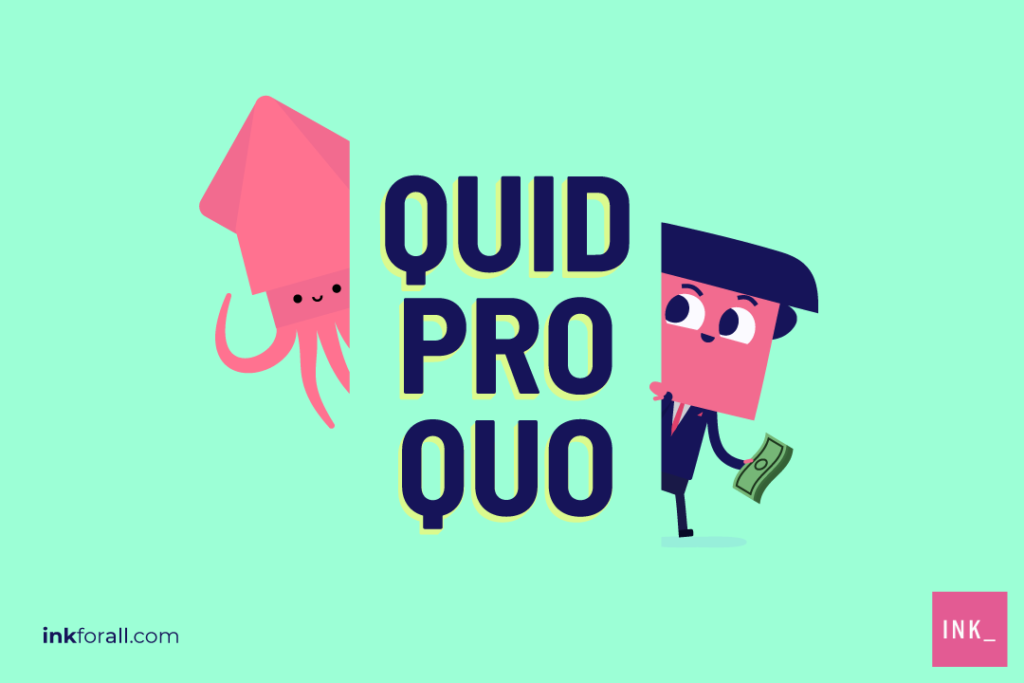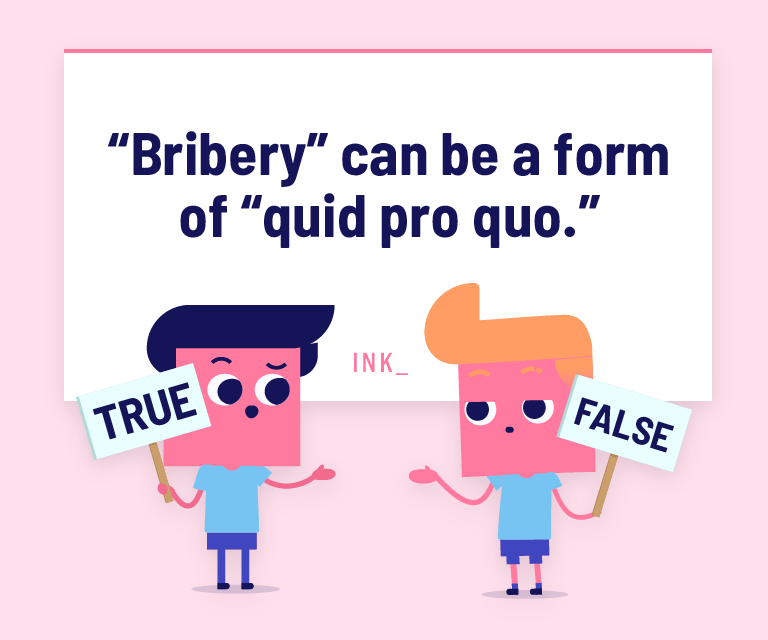Quid pro quo is a Latin term that translates to “something for something“ in English. People often use the term to indicate an exchange of goods or services for a favor or advantage.
See how to use quid pro quo, and discover why this Latin term found itself at the forefront of American media in 2019.
Main Quid Pro Quo Takeaways:
- Quid pro quo translates to something for something.
- The phrase refers to an exchange of goods or services for a favor or advantage.
- A quid pro quo can form the basis of legal cases in politics and sexual harassment claims.
- Quid pro quo is a legal requirement for contracts to be enforceable.
- Bribery is a specific type of quid pro quo.
- The 2019 Ukraine scandal involving President Donald Trump brought quid pro quo into mainstream use.
- Other phrases for quid pro quo include tit for tat, this for that, and trade-off.
- Derived from the Latin quid pro quo, quid is a slang term for the British pound.
Anyone who’s seen Silence of the Lambs has heard the term quid pro quo. If you’re a fan of the classic 1991 thriller, you can probably hear Anthony Hopkins as Hannibal Lector, saying, “Quid pro quo, Clarice.Quid pro quo.”
But what exactly does that mean?


When Hannibal Lecter offered Clarice Starling a quid pro quo in Silence of the Lambs, he indeed wanted something for something. Ultimately, Clarice traded her deepest, darkest secrets for Lecter’s help to catch a serial killer. Thankfully, not all quid pro quos are quite as dramatic.
What Does Quid Pro Quo Mean Literally?
Like many words and phrases of Latin origin, quid pro quo has found a place in the English language. It indicates an exchange of goods, favors, or services for some advantage. It translates roughly to this for that or something for something and means one thing in exchange for another.
The said term is a popular expression in fields where exchanges are common, such asfinance, law, and politics. It may take on specific meanings in these areas.
How Do You Use Quid Pro Quo?
Quid pro quo is a Latin phrase that means reciprocal exchange. In most cases, the phrase functions as a noun. However, it can also be used as an adjective to describe the mutual exchange. Although of Latin origin, quid pro quo is an established term in the English language, so there is no need to italicize it. Below are some examples of how you use quid pro quo in a sentence:
English Phrases For Quid Pro Quo
This official-sounding word may not be a comfortable fit in most people’s conversational vocabulary. If you want to trade Latin for more colloquial English, several expressions convey a similar sentiment:
- Tit for tat
- Back and forth
- Trade-off
- If you scratch my back, I’ll scratch yours
- This for that
- A favor for a favor
- One hand washes the other


Quid Pro Quo in the Field of Medicine
In modern times, the expression has expanded to include exchanges of all kinds. It’s now used across a variety of areas, including law and politics.
Is Quid Pro Quo a Legal Term?
Although the legal definition of quid pro quo is the same as its general meaning, it can have specific applications in the common law. In fact, an enforceable contract between individuals (excluding merchants) requires a quid pro quo. In this situation, parties must exchange something of value to indicate an intent to adhere to the contract. It’s also known as mutual consideration.


1. Legal Applications for Politics
Quid pro quo can also form a foundation for legal cases surrounding politics. It refers to the use of political power for personal gain. This is a violation of the law.
2. Legal Applications in Sexual Harassment Cases
In sexual harassment cases, quid pro quo refers to a situation where an employer expects sexual favors as a condition of employment or benefits. It’s also known as an abuse of power.
3. Legal Applications for Criminals in Court
Quid pro quo can also apply to individuals charged with a crime, providing a reduced sentence in exchange for a confession or vital information.
Is Bribery a Synonym for Quid Pro Quo?
Quid pro quo means “something for something” and is a neutral exchange. Bribery is a specific form of quid pro quo that oversteps legal or moral boundaries. It’s defined as a transfer, acceptance, or solicitation of something of value that directly influences the actions of someone in public office. It can also apply to someone who has a legal duty.


The recipient and the offering party can both incur criminal charges in this white-collar crime. Soliciting a bribe is illegal and can result in criminal charges regardless of whether the bribe is completed.
Every pine is a tree, but not every tree is a pine. In much the same way, every bribe is a quid pro quo, but not every quid pro quo is a bribe.
What Is Another Term for Quid Pro Quo?
You can use quid pro quo as a noun or an adjective. However, quid pro quo could take on a negative connotation, depending on how or when you use it. As such, you must know when to use alternative terms to minimize the negative impact of quid pro quo.
Suppose you want to emphasize an advantage that makes the resulting loss or degradation necessary. In that case, you can skip quid pro quo and use the following terms:
- Trade-off
- Compromise
- Bargain
- Settlement
- Arrangement
If you are talking about an exchange of one thing for another, you can replace quid pro quo with:
- Exchange
- Swap
- Barter
- Deal
- Replace
If you are referring to compensation due to an injury or a loss, you may use the following words in place of quid pro quo:
- Remuneration
- Compensation
- Indemnity
- Reimbursement
- Amends
- Refund
- Reparation
Quid Pro Quo Takes Center Stage: President Trump and the 2019 Ukraine Scandal
This Latin term recently found its way into mainstream vocabulary, thanks to President Trump and the 2019 Ukraine scandal. The events that took place ultimately led to the impeachment of the 45th president of the United States.
Two quid pro quos formed the heart of the impeachment trial:
1. A White House Meeting in Exchange for Investigations
The first alleged quid pro quo involved a potential White House meeting between Ukrainian President Zelensky and American President Trump. The meeting would happen in exchange for two investigations:
- Ukraine looking into alleged Ukrainian interference in the 2016 presidential election.
- An investigation of a Ukrainian gas company where Hunter Biden, son of Trump’s political rival Joe Biden, sat on the board of directors.
2. Military Aid in Exchange for Investigations
The second alleged quid pro quo in the Trump/Ukraine scandal involved almost $400 million to aid Ukraine in its conflict with Russia. The funding, which had been frozen, would be released when Ukraine publicly committed to the two investigations listed above.
The Quid in British Slang
In Great Britain, the word quid is a slang term for the British pound, a unit of currency in the country. The term likely had its origins in quid pro quo, coming to Britain during the Roman occupation in the 1st through 5th centuries AD.
With its applications in law, politics, and pop culture, quid pro quo will probably remain a part of our language for the foreseeable future. Understanding the quid pro quo‘s uses may make it easier to follow current events, court cases, and even your favorite legal drama.
Quick Grammar Quiz About Quid Pro Quo
Quid pro quo Question #1


The answer is D. It indicates an exchange of goods, favors, or services for some advantage.
Quid pro quo Question #2


The answer is D. All of these are English expressions for “quid pro quo.”
Quid pro quo Question #3


The answer is TRUE. Bribery is a specific form of quid pro quo that oversteps legal or moral boundaries.
Quid pro quo Question #4


The answer is C. “Quid” is a slang term for the British pound, a unit of currency in the country.

Comments (0)
Least Recent